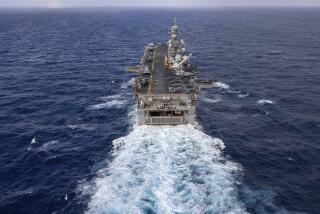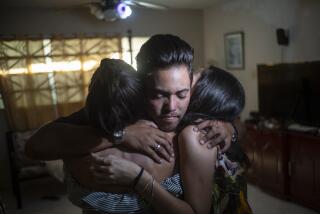U.S. to Block Any Repeat of Cuban Boat Lift
- Share via
WASHINGTON — The Clinton Administration is prepared to virtually blockade the 90-mile-wide strait between Florida and Cuba if Cuban President Fidel Castro launches a repeat of the 1980 Mariel boat lift, in which he sent thousands of Cubans to America’s shores.
Key Administration officials said the effort would involve dozens of Coast Guard vessels, from relatively small surfboats to cutters of 100 feet or more, aided by Coast Guard and Navy surveillance aircraft. The Coast Guard already has moved additional ships into the area.
Officials said the major thrust of the operation would be aimed at keeping Cuban Americans who live in South Florida from sailing for Cuba to try to pick up any refugees who might be en route to American shores--a factor that proved a major problem in the 1980 incursion.
The contingency plan, drafted in 1981 after the Mariel boat lift, has been kept on the shelf pending a second Castro-spawned flight from Cuba. U.S. officials have been reluctant to talk about the four-inch-thick document for fear of encouraging Castro to order a new exodus; many think he duped the United States the last time, in part, by sending throngs of Cuba’s undesirables to America’s shores.
But while stressing that no such plan has been put into effect yet, State Department spokesman Mike McCurry told reporters Wednesday that “there is contingency planning . . . under way,” and other officials sketched the plan’s broad outlines.
The moves came as U.S. officials released 25 of 26 people who were recovered Tuesday from a Cuban government vessel that Havana had claimed had been hijacked by refugees.
The vessel, a green-hulled, 50-foot concrete boat, was intercepted by the Coast Guard 35 miles north of Cuba late Tuesday afternoon and escorted to Key West, Fla., where it tied up at 12:30 p.m. Wednesday. Justice Department officials began interviewing those on board then.
Among them was a young man in military fatigues. Refugees told Coast Guard officers he was a Cuban border patrol guard who engineered the hijacking, then stopped to pick up relatives near Mariel.
The individual who was detained was identified as Leonel Macias Gonzalez. Justice Department officials declined to say whether Gonzalez is the alleged mastermind of the hijacking.
Alfonso Fraga, director of the Cuban Interests Section, which represents Cuba in Washington in the absence of full diplomatic ties with the United States, had said Tuesday that a Cuban navy lieutenant was killed in the hijacking. The refugees said shots had been fired but no one had been killed.
On Wednesday, Fraga backed away from his assertion but continued to criticize the United States for a Cuba policy designed to “foment disturbances that (could) lead to a blood bath in my country.”
Justice Department officials said the stories of the two sides conflicted so sharply that they had been unable to tell whether the boat really was stolen and whether the hijackers had killed the navy lieutenant, as the Cuban government had alleged.
Meanwhile, a yellow biplane rigged as a crop duster landed in Marathon, in the Florida Keys, with 14 Cuban defectors aboard. A spokeswoman for the local sheriff’s office said the pilot worked as a crop duster and those aboard were all his relatives.
On Tuesday, the Coast Guard reported that it had picked up 116 Cubans in the Florida Strait. That brought to almost 5,300 the number of Cuban emigres who have sailed to the United States this year.
The Clinton Administration still has not decided what to do about the latest incidents. Washington is eager to see Castro overthrown but would prefer that any such transition be smooth and not spawn an exodus of Cubans to the United States.
The United States has no formal treaties with Cuba governing hijackings by air or sea and, therefore, has no obligation to punish or return refugees who land here.
Key Administration officials have met privately with leaders of South Florida’s Cuban American community to urge them to keep calm and “not play into Castro’s hands” during the current uncertainty.
Miami City Manager Cesar H. Odio said local officials have reviewed emergency plans. Federal agents have been visiting Miami-area marinas, watching for indications that boat owners might be preparing for trips to Cuba.
The Mariel boat lift sent 125,000 Cubans to Florida’s shores over a five-month period; the group included sizable populations of criminals and the mentally ill.
*
Times staff writer Pine reported from Washington and Times special correspondent Clary reported from Miami. Anna M. Virtue of The Times’ Miami Bureau contributed to this report.
More to Read
Sign up for Essential California
The most important California stories and recommendations in your inbox every morning.
You may occasionally receive promotional content from the Los Angeles Times.













